#kidney hospital in varanasi
Explore tagged Tumblr posts
Text
BK Kidney Care Hospital: Best Kidney Disease treatment In Ayurveda In India
Established in 2000, BK Kidney Care Hospital is committed to providing affordable, high-quality healthcare. We specialize in Ayurvedic treatments, offering therapies like Panchakarma, Abhyanga (oil massage), Shirodhara (pouring liquids over the forehead), Nasya (nasal treatments), and herbal remedies.
Our approach is personalized, ensuring that each patient receives care tailored to their needs. We combine traditional Ayurvedic methods with Yoga, Meditation, and Dietary Therapy to promote overall well-being.
One of our main goals is to help kidney patients stop dialysis permanently and reduce high creatinine levels. We focus on treating the root causes of kidney problems, aiming to improve kidney function and enhance our patients' quality of life.
Our dedicated team of doctors and therapists work together to provide the best care possible. At BK Kidney Care Hospital, we are committed to helping our patients achieve long-term health and wellness through natural and holistic treatments.

#kidney disease#kidney disease treatment#best ayurvedic kidney hospital#k9idneyhospital in india#kidney hospital for stop dialysis#kidney hsopital in patna#kidney hospital in varanasi
0 notes
Text
Lifeline Hospital Sundarpur Varanasi: Your Trusted Healthcare Partner for Comprehensive Medical Care
In the vibrant city of Varanasi, Lifeline Hospital Sundarpur stands as a beacon of hope for patients seeking quality healthcare. Known for its state-of-the-art facilities and compassionate care, this Best multi-specialty hospital In Varanasi has earned a reputation as one of the best medical centers in the region. Offering a wide array of services ranging from emergency treatments to complex surgeries, Lifeline Hospital is truly a lifeline for the people of Varanasi and beyond.
Why Choose Lifeline Hospital Sundarpur?
Comprehensive Healthcare Services Lifeline Hospital offers a vast range of medical services, making it a one-stop destination for all healthcare needs. Whether it’s routine health checkups, emergency medical services, or advanced surgical interventions, the hospital has a team of expert doctors and modern infrastructure to ensure the best outcomes.
Expertise in Emergency Care Lifeline Hospital specializes in emergency medical care, with round-the-clock services available for critical conditions. Whether you are dealing with a heart attack, stroke, or accident-related trauma, the hospital's emergency team is well-equipped to provide immediate attention.
Advanced Heart Care & Surgery Heart diseases are a major concern for many, and Lifeline Hospital offers world-class heart care. From preventive cardiology to heart surgeries such as bypass surgery, angioplasty, and valve repair, patients can rely on Lifeline for the most advanced treatments in heart care.
Neurology and Neuro Surgery With a team of expert neurologists and neurosurgeons, Lifeline Hospital provides comprehensive care for neurological disorders. Whether it's treating stroke, epilepsy, or complex brain surgeries, the hospital’s specialized team ensures that every patient receives personalized, high-quality care.
Kidney and Liver Treatment Lifeline Hospital offers exceptional care for kidney and liver-related diseases. From dialysis to kidney transplants and liver treatments, the hospital uses the latest medical technologies and procedures to manage and treat complex conditions, ensuring the best possible outcomes for patients.
Joint & Orthopedic Care Joint problems, including arthritis and fractures, are common issues that many people face. The hospital’s orthopedic department provides advanced treatments such as joint replacements, arthroscopy, and fracture management, helping patients regain mobility and quality of life.
Other Specialties Lifeline Hospital also provides specialized care in a range of medical fields including gastroenterology, pulmonology, gynecology, pediatrics, and more. The hospital’s holistic approach to healthcare ensures that patients receive well-rounded treatment under one roof.
World-Class Infrastructure and Technology
Lifeline Hospital is equipped with cutting-edge technology to deliver the best possible medical care. The hospital's advanced diagnostic tools, surgical equipment, and ICU facilities make it one of the most trusted hospitals in Varanasi for handling critical cases. Their modern operation theaters, intensive care units (ICUs), and dedicated recovery wards provide a comfortable and safe environment for patients.
Experienced and Compassionate Medical Team
The hospital is home to a team of highly skilled and experienced doctors, surgeons, and nurses who are dedicated to providing the best possible care to every patient. The medical team at Lifeline Hospital is known for its expertise, professionalism, and compassionate approach, ensuring that patients feel supported and cared for throughout their treatment journey.
Patient-Centric Approach
At Lifeline Hospital, patient care is the top priority. The hospital is committed to offering personalized treatment plans tailored to meet the specific needs of each patient. From initial consultation to post-operative care, every step is handled with the utmost attention to detail, ensuring a smooth and positive healthcare experience.
Convenient Location and Accessibility
Located in Sundarpur, Varanasi, Lifeline Hospital is easily accessible for residents of the city and surrounding areas. With its strategic location and well-connected transportation network, patients can reach the hospital quickly, especially in times of emergency.
24/7 Availability
Lifeline Hospital operates 24/7, ensuring that expert medical care is always available when you need it the most. Whether it’s a medical emergency, a routine check-up, or a specialized treatment, the hospital’s medical team is just a call away.
Lifeline Hospital Sundarpur Varanasi is committed to providing high-quality healthcare services with a focus on patient safety, advanced treatments, and compassionate care. Whether you're dealing with a heart condition, neurological issue, kidney or liver disease, or any other medical problem, Lifeline Hospital is here to offer you expert care in a timely and effective manner.
With a reputation for excellence in emergency treatments, surgeries, and overall healthcare services, Lifeline Hospital continues to be a trusted healthcare partner for the people of Varanasi and beyond.
For more information or to book an appointment, visit Lifeline Hospital Sundarpur Varanasi or call our helpline at [Phone Number]. Your health, our priority!
0 notes
Video
youtube
किडनी खराब हो तो घबराये नहीं - बस एक बार ये वीडियो जरूर देखे - Stop Kidney Dialysis For ever
#KidneyProblem means the kidney is not able to clean up the waste products and balance the mineral/ water level in the body. #Best_Ayurvedic_Medicine_For_Kidney_Failure (#किडनी_की_संजीवनी_दवा) is safe, effective, and has no side effects. BK Arogyam is one of #BestAyurvedic_Kidney_Hospital_in_Varanasi_India that has cured many kidney disease patient through natural procedures. #KidneFailureMedicines that work on the root cause of the disease and helps in the full recovery of the patients without dialysis and transplants and any patient can #stop_Kidney_dialysis forever.
For More Videos See Our Youtube Channel: BK Arogyam
#kidney treatment#best ayurvedic doctor for kidney failure#best kidney hospital in india#kidney hospital in varanasi#kidney care treatment by bk arogyam#stop kidney dialysis for ever#solution of all kidney disease#kidney ki bimari ka ilaz#creatinine level ko kam kaise kare#how to stop kidney dialysis
2 notes
·
View notes
Link
The kidneys are important organs that help the body get rid of waste. Stones, cysts, failure, urinary infection, decreased metabolism, hormonal imbalances, elevated blood pressure, and other kidney illnesses can take many different shapes and severity levels.
0 notes
Text

Gynecologist Obstetricians in Lucknow - Apollomedics Hospitals
If you are looking for the “Best gynecologist in Lucknow” Apollo medical Hospitals has got you covered with our skilled experts and cutting-edge technologies, Apollo Medical Institute of “Obstetrics & Gynecology” provides complete treatment for all obstetrics, high-risk pregnancies, and gynecological diseases. Apollo Medical provides a more convenient alternative to surgical treatment, as well as diagnostic and preventative services.
Our Service:
Hospitals in Lucknow - Apollo
Heart Bypass Surgery in Varanasi
Bypass Surgery in Kanpur
Heart Surgery Hospitals in Gorakhpur
Heart surgeon in Allahabad
Kidney - Transplant
Breast-Cancer
Blogs
#Gynecologist Obstetricians Hospitals#gynecologist#Super Specialty Hospitals in Lucknow#Gynecology in Lucknow Hospitals#Gynecology Doctors in Lucknow#Best Gynecology Doctor
0 notes
Text
Kidney Care
Kideny hamare sarir ka sabse mahatwapurn ang hai.Iska karya manav sarir ke awanchaniy padartho ko sarir se bahar niklana hai .Yah manav sarir me ek filter ki tarah karya karta hai. Manav sharir me 2 kideniya hoti hai. Agar manav sharir ka kideny swasth hai to manav sharir kafi healthy hota hai.

Kidney Kharab hone ke karan :
Sharir me kideny kharab hone ke kai karan ho sakte hai.
1- Atyadhik matra me pani na pina .
2- Hamesha oily food khana.
3- Atyadhik matra me alkohal ka sewan karana.
4- Safai se khana pina na khana etc.
KIDENY KHARAB HONE KE SANKET.
1- Sharir me hamesa thakawat ka hona.
2-Pesab ka kam hona.
3- Pesab me jalan ka hona.
4- Pesab ka rang asamanya hona etc.
FOR MORE INFORMATION AND DETAILS VISITE AT- Our adviser
1 note
·
View note
Text
Best Kidney Disease Treatment In Ayurveda -Best Ayurvedic Hospital For Kidney Treatment without Dialysis IN Ranchi Jamshedpur, Jharkhand

Ajay Kumar Yadav, a kidney patient from Jharkhand, faced a challenging journey. After consulting multiple hospitals, doctors advised him to undergo dialysis due to his high creatinine level, which had reached 11.4 mg/dl. Desperate for an alternative, Ajay learned about BK Kidney Care Hospital in Varanasi, renowned for its Ayurvedic treatments.
With hope, Ajay traveled from Jamshedpur to Varanasi. Within just seven days of treatment at BK Kidney Care Hospital, his creatinine level significantly reduced to 8 mg/dl. The hospital has a strong reputation for helping patients stop dialysis permanently through effective therapies and Ayurvedic medicine.
BK Kidney Care Hospital has successfully treated many patients, allowing them to overcome kidney disease without the need for dialysis. If you're seeking a natural and effective solution for kidney treatment, BK Kidney Care Hospital in Varanasi is one of the best options.
#bk kidney care hospital#chronic kidney disease treatment#kidney specialist doctor in india#kidney treatment in Jharkhand#best kidney hospital in ranchi#best kidney hospital in jamshedpur#kidney specialist doctor in ranchi#best nephrologist doctor in ranchi#top kidney specialist in ranchi#dialysis treatment in ayurveda#ayurvedic treatment for kidney in india#stop kidney dialysis in ranchi#kidney treatment in ayurveda#ayurvedic medicine for kidney#ms dhoni
0 notes
Text
एक और दर्दनाक दास्तां: कोरोना के चलते पिछले लॉकडाउन में घर लौटा था, दूसरी लहर में गई जान, मां अकेले ई-रिक्शे में बेटे का शव लेकर भटकती रही
एक और दर्दनाक दास्तां: कोरोना के चलते पिछले लॉकडाउन में घर लौटा था, दूसरी लहर में गई जान, मां अकेले ई-रिक्शे में बेटे का शव लेकर भटकती रही
Hindi News Db original In Varanasi, A Mother Wandered In For Treatment Of Her Son’s Kidney, Lost Her Life Due To Lack Of Admission In The Hospital. Ads से है परेशान? बिना Ads खबरों के लिए इनस्टॉल करें दैनिक भास्कर ऐप वाराणसी3 मिनट पहले कॉपी लिंक ई-रिक्शा में मौजूद विनीत की मां का यह फोटो सोशल मीडिया पर वायरल हुआ था। देश कोरोना से जूझ रहा है। इस मुश्किल वक्त में मानवता को झकझोर देने वाली कई…

View On WordPress
0 notes
Text
Why Choosing the Best Urology Hospital in Varanasi Matters for Your Health?
Selecting the right hospital for your urological needs is a critical decision that can significantly impact your overall health and well-being. As the best urology hospital in Varanasi, we understand the importance of providing top-notch care to our patients. In this blog, we explore why choosing a reputable urology hospital is essential and how the quality of care at the best hospitals can make a difference in patient outcomes.

Importance of Specialized Care
Urology is a complex field that deals with a wide range of conditions affecting the urinary tract and the male reproductive system. From common issues like kidney stones and urinary tract infections to more severe conditions like prostate cancer and bladder dysfunction, urological problems require specialized attention. Choosing the best urology hospital in Varanasi ensures that you receive care from highly trained and experienced urologists who specialize in diagnosing and treating these conditions.
Access to Advanced Technology
The best urology hospitals are equipped with the latest medical technologies and equipment, enabling them to provide accurate diagnoses and effective treatments. Whether it's using minimally invasive surgical techniques or employing state-of-the-art imaging systems, these hospitals are at the forefront of medical advancements. By opting for the best urology hospital in Varanasi, patients can benefit from the most up-to-date treatments, which can lead to quicker recoveries and better outcomes.

Comprehensive Treatment Options
A reputable urology hospital offers a wide range of treatment options tailored to the unique needs of each patient. From medication management and non-surgical interventions to advanced surgical procedures, the best urology hospital in Varanasi provides comprehensive care under one roof. This integrated approach ensures that patients receive a personalized treatment plan that addresses all aspects of their condition.
Focus on Patient Comfort and Care
Beyond the technical expertise and advanced treatments, the best urology hospital in Varanasi prioritizes patient comfort and care. A compassionate and supportive environment can make a significant difference in a patient’s experience and recovery. Hospitals with a patient-centric approach focus on clear communication, empathy, and support throughout the treatment process, ensuring that patients and their families feel heard and cared for.
Improved Patient Outcomes
The ultimate goal of any healthcare provider is to achieve the best possible outcomes for their patients. By choosing the best urology hospital in Varanasi, patients have a higher likelihood of successful treatment outcomes. The combination of expert medical care, advanced technology, and a compassionate approach contributes to improved recovery rates, reduced complications, and a better quality of life for patients.

Conclusion
Your health is your most valuable asset, and when it comes to urological care, choosing the best urology hospital in Varanasi is paramount. With specialized care, advanced technology, comprehensive treatment options, and a focus on patient comfort, the best hospitals ensure that you receive the highest standard of care. Don’t compromise on your health—opt for the best, and experience the difference that expert urological care can make in your life.
1 note
·
View note
Video
youtube
क्यों है डायलिसिस का इलाज झूठा जाने इसके पीछे का सच-How To Avoid Kidney...
#क्यों_है_डायलिसिस_का_इलाज _झूठा_जाने_इसके_पीछे_का_सच #How_To_Avoid_Kidney_Dialysis. #क्यों_बचना_चाहिए_किडनी_प्रत्यारोपण_सर्जरी_और_डायलिसिस_से Actually Dialysis is costly process and every body cannot afford of cost of #KidneyDialysis and #kidney_Transplant. So numerous hospital are providing #ayurvedic_medicine_for_kidney_treatment but best one is BK Arogyam Hospital. Call Us:- +91-8081222333. Send Report On Whatsapp: +91-9336660001 Book Your Appointment On Practo: https://www.practo.com/varanasi/clini... Enquiry Now On JustDial : https://goo.gl/g9e278 Check Out More Details : - http://www.bkkidneycare.com/
20 notes
·
View notes
Text
Are You Looking For the Dental Hospital In Varanasi?
If you reside anywhere in Uttar Pradesh, seeing a dental in Varanasi is just as crucial to maintaining good heart health as seeing a cardiologist. Because we believe that the kidneys, heart, and liver are more vital than dental health, we frequently disregard it.
Keep in mind that by using it, your health is at risk. Being a dentist and being able to address all of your dental requirements completely requires a great deal of knowledge. One of the best dental hospitals in Varanasi, we are well loaded with the most up-to-date tools and supplies.
Why should you go to the dentist?
0 notes
Text
TESTING THE HEART
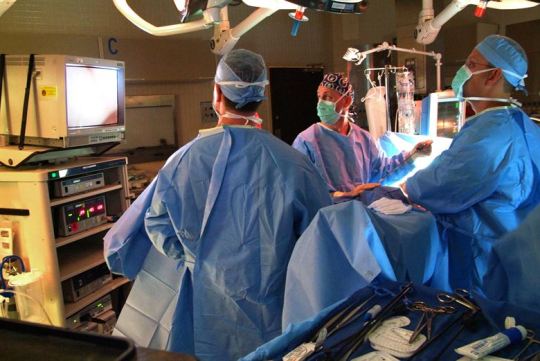
Heart care has become an industry. A number of heart institutes are being opened every day worth crores of rupees, in one or the other part of the country. The main aim of these institutions is to make money by performing as many bypass surgeries or angioplasties, because these operations only can earn astronomical amount of money. Estimations of Rs. 3 Lacs to Rs. 5 Lacs for one such operation are not uncommon. Some of the hospitals still perform these operations for as low as 65000, if they are in a small city like Coimbatore or Varanasi!
In these hospitals, necessary and unnecessary investigations or tests are also performed as a secondary source of revenue. Every cardiologist sends for a battery of investigations. Blood samples are drawn several times from the patients in a day in these hospitals. Many of these investigations are also done for the outdoor (OPD) patients also. The other day one of my patients told me that for tests only he has spent about Rs, 50000 in a heart hospital and then told him to bring another 3 lacs for the angioplasty. Mostly these patients are not explained what these tests are, why were they necessary and what are the interpretations.
In this issue we thought we should inform our readers about some of the investigations that are possible for a heart patient and their meanings. Some of the tests are almost compulsory to perform in a suspected heart patient or a confirmed heart patient. Some of them are to be performed on special occasions. In this issue we shall find out about some of the tests, in whom they should be done and what the results would mean.
Another disturbing thing that I found in heart hospitals is that they perform another battery of tests, which may be only necessary in case patient wants to opt for an operation and they prescribe these tests without telling the patients that they are performing these tests to prepare for the heart operation. These tests are HIV tests, Hepatitis test, X ray chest, Total blood count and differential count, kidney function tests, liver function tests, Blood grouping and serum Electrolytes. Most of these tests have no bearing with the treatment of heart disease, do not perform the most needed lipid profile test, which will inform the patient about the cause of the disease.
Angiography is the most invasive of all the tests described in the this issue but the results are unreliable and approximate. I do not recommend this test mostly. It should be done only when the patient is very keen to undergo bypass surgery or angioplasty.
THE BLOOD TESTS
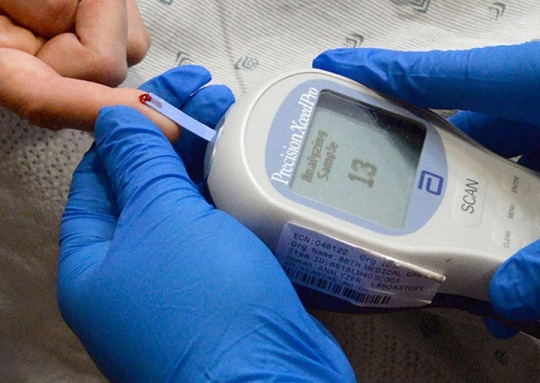
Lipid Profile
The lipid profile is a group of tests that are often ordered together to determine risk of coronary heart disease. The tests that make up a lipid profile are tests that have been shown to be good indicators of whether someone is likely to have a heart attack or stroke caused by blockage of blood vessels (hardening of the arteries).
The lipid profile includes total cholesterol, HDL-cholesterol (often called good cholesterol), LDL cholesterol (often called bad cholesterol) and triglycerides. Sometimes the report will include additional calculated values such as HDL/ Cholesterol ratio or a risk score based on lipid profile results, age, sex, and other risk factors.
The lipid profile is used to guide providers in deciding how a person at risk should be treated. The results of the lipid profile are considered along with other known risk factors of heart disease to develop a plan of treatment and follow-up.
Blood Glucose
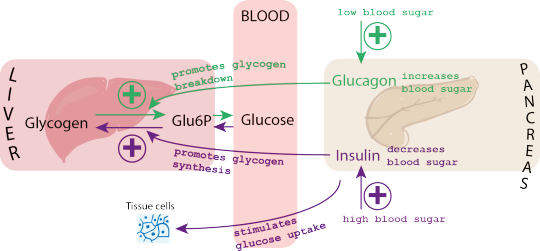
Blood glucose is the correct and scientific term. But in colloquial language people, even the doctors , use the term “blood sugar” for blood glucose. A conventional sugar test would mean testing for fasting and post prandial (PP) i.e. after meal. A good control would mean a fasting sugar of less than 100 mg/dl and a PP sugar of 140 mg/dl.
Serum Glycosylated Haemoglobin
Blood glucose estimation on a particular date can only tell about the control of diabetes on that date. But there is a blood test, which can instantly give us an idea about control of blood glucose over the past three months. This test can help in avoiding frequent blood testing and needle pricking. This test is called glycosylated haemoglobin (HbA1C). In a normal person with normal blood sugar the reading is about 6%. A diabetic with the worst of control will have a reading of about 12%. Saaol expects a figure of 7% or below. The principal behind the test is that it measures the glucose tagged haemoglobin percentage in blood. Haemoglobin (Hb) is produced in our body continuously. But on the day the blood glucose is high the haemoglobin would get tagged with glucose. Thus, the increase in the high glucose period will be associated with higher glycosylated haemoglobin.
Cardiac Enzymes
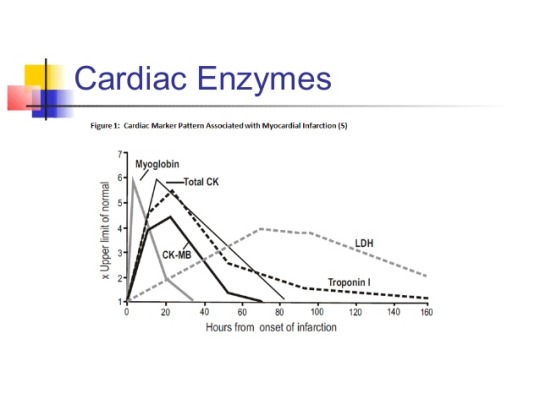
Cardiac Enzymes are protein molecules released into the blood stream from heart muscle damaged by a blocked artery. This is known as a heart attack. When someone is admitted to the hospital with a clear cut heart attack, these enzymes are measured to get an idea of how much muscle was damaged.
Many people are admitted to the hospital with apparent heart symptoms but other tests such as the ECG are inconclusive about whether a heart attack (i.e. damage to the heart muscle) actually occurred. In these cases, the cardiac enzymes are used to determine if this was a heart attack as opposed to a bad episode of angina or perhaps symptoms unrelated to the heart altogether.
The enzymes most commonly measured these days are creatine phosphokinase (CPK) (also known as creatine kinase (CK)) and Troponin.
These enzymes have a characteristic rise and fall pattern after a heart attack. It may take 4 hours or more after the onset of symptoms for the test to become abnormal and upto 24 hours for the level to peak. Consequently, blood test are taken from the patient several times. A normal blood test upon arrival in the emergency room does not mean a heart attack has not occurred. Eventually, the levels in the blood fall back to normal.
Troponin T&I
These are contractile proteins of the myofibril (heart muscle). The cardiac isoforms are very specific for cardiac injury and are not present in serum from healthy people. Troponin I is the form frequently assessed. There is new form (Troponin L) which may be detected earlier.
Rises 4-6 hours after injury
Peaks in 12-16 hours stays elevated for up to 10 days.
Electrocardiogram (ECG)

The ECG is the most commonly performed cardiac test. This is because the ECG is a useful screening tool for a variety of cardiac abnormalities; ECG machines are readily available in medical facilities; and the test is simple to perform, risk free and inexpensive.
How is the ECG performed?
The patient lies on an examination table, and 10 electrodes (or leads) are attached to the patients arms, legs and chest.
The electrodes detect the electrical impulses generated by the heart, and transmit them to the ECG machine. The ECG machine produces a graph (the ECG tracing) of those cardiac electrical impulses. The electrodes are then removed. The test takes less than 5 minutes to perform.
What information can be gained from the ECG?
From the ECG tracing, the following information can be determined:
· The heart rate
· The heart rhythm
· Whether there are “conduction abnormalities” (abnormalities in how the electrical impulse spreads across the heart).
· Whether there has been a prior heart attack
· Whether there may be coronary artery disease
· Whether the heart muscle has become abnormally thickened.
All of these features are potentially important. If the ECG indicates a heart attack or possible coronary artery disease, further testing is often done to completely define the nature of the problem and decide on the optimal therapy.
The Echocardiogram
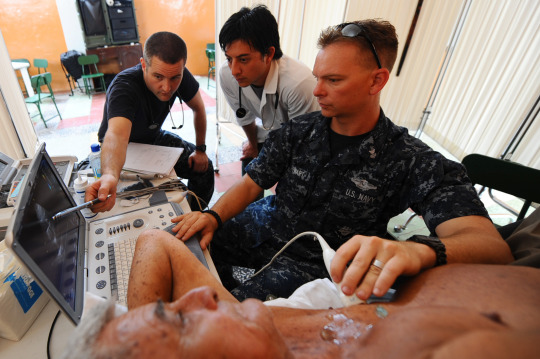
The echocardiogram is an extremely useful test for studying the heart’s anatomy. It is non-invasive and entirely safe, and when interpreted by well-trained cardiologists, is very accurate.
How is the echocardiogram performed?
The patient lies on a bed or examination table, and the echo technician places a transducer (a device that resembles a computer mouse) over the chest wall. The transducer is moved back and forth across the chest wall, collecting several “views” of the heart.
The Stress Test
Some forms of cardiac disease are easily missed when the patient is at rest, because at rest the patient’s physical examination and ECG are often entirely normal. In these cases, cardiac abnormalities may become apparent only when the heart is asked to perform at increased workloads.
The stress test is used to evaluate the heart and vascular system during exercise. It helps to answer two general questions: 1) Is there occult underlying heart disease that only becomes apparent when the heart is stressed by exercise? 2) If there is underlying heart disease, how severe is it?
How is a stress test performed?
The patient is attached to an ECG machine, and a blood pressure cuff is placed on one arm. Sometimes a clothespin-like sensor is attached to the finger to measure the amount of oxygen in the blood. After a baseline ECG is obtained, the patient begins to perform a low level of exercise , either by walking on a treadmill, or pedaling a stationary bicycle. The exercise is “graded”- that is every three minutes, the level of exercise is increased. At each stage of exercise the pulse, blood pressure and ECG are recorded, along with any symptoms the patient may be experiencing.
With a “maximal” stress test, the level of exercise is gradually increased until the patient cannot keep up any longer because of fatigue, or until symptoms (chest pain, shortness of breath, or lightheadedness) prevent further exercise, or until changes on the ECG indicate a cardiac problem. Maximal stress tests should be performed when the goal is to diagnose the presence or absence of coronary artery disease.
After the test, the patient remains monitored until any symptoms disappear, and until the pulse, blood pressure and ECG return to baseline.
Hope you liked this article!
This article is written by Dr. Bimal Chajjer (Heart Care Specialist)
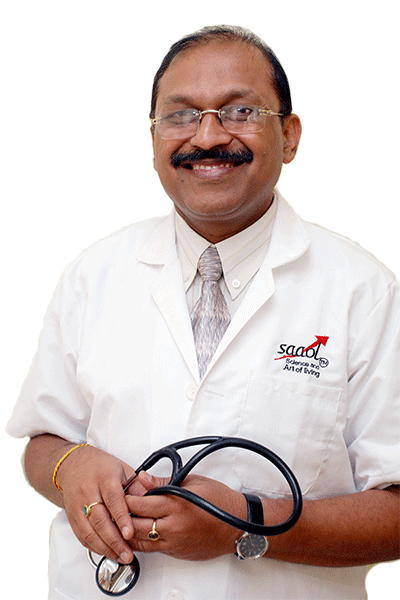
0 notes
Text
youtube
Coronary Artery Bypass Surgery in Varanasi - Apollo Hospitals
Apollomedics Hospitals is an established multi-speciality Hospital in Lucknow that provides Healthcare services to Varanasi citizens. Their vision is to provide patients suffering from physical and mental illnesses with a healthier and better life. They adapt and upgrade to the highest quality by acquiring the most up-to-date medical equipment, machinery, effective knowledge, and proactive services to improve human life medically and ethically.
Holter monitoring is available 24 hours a day, as is imaging, blood pressure monitoring, a diagnostic center, ventilators, and life support ambulances.
Adult & Pediatric Heart Transplant & CTVS Surgeon Senior Consultant- Dr. Bharat Dubey from our Hospital visit Varanasi every 4th Friday of the month from 11:00am to 2:00pm at Heritage Hospital, Varanasi.
Our Service:
Hospitals in Lucknow - Apollo
Heart Bypass Surgery in Varanasi
Bypass Surgery in Kanpur
Heart Surgery Hospitals in Gorakhpur
Heart surgeon in Allahabad
Kidney - Transplant
Breast-Cancer
Blogs
#Heart Bypass Surgery in Varanasi#Heart Bypass Surgery#Bypass Surgery in Varanasi#Heart Surgery Hospitals in Varanasi#Heart Surgery Hospitals#Cardiologists Surgeon in Varanasi#Youtube
0 notes
Link
On World Kidney Day, Varanasi Hospital, the best hospital in Varanasi is back with another informative blog. Let’s learn about 6 kidney-damaging habits.
0 notes
Text
4 tips for coping with an enlarged prostate

Benign prostatic hyperplasia (BPH) is also called enlarged prostate is a common condition as men get older. About 75% of men over 50 have symptom enlarged prostrate. The prostate is a muscular gland located in the male reproductive system. The gland secretes prostate fluid a component of the semen. The prostate gland also helps the semen fluid to flow. An enlarged prostate can obstruct the flow of urine from the bladder. The bladder, urinary tract or kidney problem can also be caused by the condition.
Symptoms
Symptoms of an enlarged prostate can vary and tend to worsen over time. Common symptoms of an enlarged prostate are:-
Frequent or urgent need to urinate
Repeated need to urinate at night.
Problems starting urination
Slow or dribbling urine stream
Problems in completely emptying the bladder
Symptoms of the condition progress the enlarged prostate cfan block your urethra leading to
Bladder stones
Bladder infection
Blood in the urine
Complete blockage of urine
Kidney damage.
You should visit a best urologist in Varanasi if you have any urination problems. There may be many reasons for the problem.
Causes
Benign prostatic hyperplasia (BPH) is a normal result of aging. This may be caused due to changes in the male sex hormone. Your family history of an enlarged prostate may increase the risk of BPH. Men with diabetes and heart diseases are at higher risk of an enlarged prostate.
Diagnosis
Your urologist will start by reviewing your medical history and performing a physical exam. They will examine your medication to rule out if the medication is affecting the flow of urine. The exam may include
Digital rectal examination the urologist near me physically check the prostate for enlargement
Urinalysis (Urine Analysis) to rule out infection or any other medical condition.
Cystoscopy to examine urethra and bladder under the scope.
Ultrasound to examine the prostate gland
PSA blood test to screen for prostate cancer.
Uroflowmeter to measure the rate of the urine flow
Urodynamic pressure to test pressure in the urine while you urinate.
Treatment
Various treatment methods can be used by the best doctor in Varanasi. The urologist may opt to treat enlarged prostate:-
Medically
Minimal invasive
Surgery
The treatment option will be decided based on your age, health, the size of the enlargement, and your degree of discomfort.
Medication prescribed by the best urologist in Varanasi may include:-
Alpha-blockers
5-Alpha Reductase Inhibitors
Combined drug therapies
Tedalafil
You can order your medication at home for your convenience.Zifftech helps you to book doctor appointment, lab test at home, diagnostic center in Varanasi to book different health packages.
Minimal invasive or surgical therapy is recommended when your symptoms are medium to severe. Minimum invasive therapies that can be done in the outpatient department is done under local anesthesia. Surgeries require hospitalization. Surgical options for enlarged prostate by a urologist in Varanasi:-
Transurethral resection of the prostate (TURP)
Transurethral elctrovaporization (TUNA)
Transurethral microwave thermotherapy (TUMT)
Laser therapy
Men often ignore symptoms of benign prostatic hyperplasia (BPH) and wait till symptoms become moderate to severe. Early treatment can prevent complicated complications.
#Best urologist in Varanasi#Urologist in Varanasi#Book doctor in Varanasi#Doctors in Varanasi#Blood test at home#Diagnostic center in Varanasi#Blood test in Varanasi#Doctor appointment in Varanasi#Lab test at home#Lab test in Varanasi
0 notes